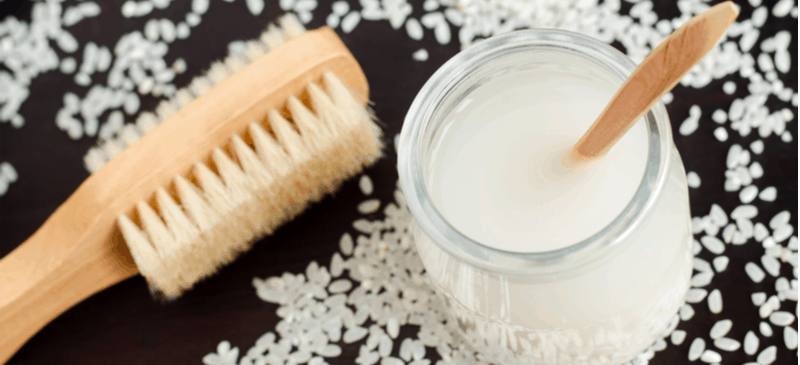
If you regularly soak and cook rice at home, you probably throw away the leftover “rice water” once you’re done. But believe it or not, rice water, the milky liquid leftover when you soak rice for several hours, offers a bunch of benefits for hair health and beyond — and rice water for hair isn’t the only use.
Not only may rice water promote hair growth and defend against hair thinning, but it also seems to offer benefits for those with sensitive and aging skin. Considering it can be made with two very inexpensive and widely available ingredients, water and rice, there’s little reason not to give it a try.
How to Use Rice Water for Hair
First and foremost, what is rice water, and why is beneficial? Rice water (sometimes called kanji) is a cloudy liquid made by soaking rice for a few hours.
Some rice water is also fermented, which means it has sit for longer and developed some beneficial compounds, just like other fermented foods.
Rice (Oryza sativa) is a grain that contains a number of nutrients. When rice is soaked in water, some of these nutrients are released into the liquid, which can then be applied to hair or your skin.
Rice water has been found to contain:
- Antioxidants, such as phenolic and flavonoid compounds
compounds - Vitamin B6
- Vitamin E
- Starches, polysaccharides and other carbohydrates
- Amino acids (the building blocks of proteins, which also help form and repair hair)
- Organic acids
Fermented rice water also has been shown in some research to contain a compound called inositol, a type of sugar molecule with free radical-fighting capabilities that may help protect hair breakage damage. Additionally, it contains the compound called pitera, a byproduct of yeast fermentation, which is associated with cellular renewal.
One study published in the International Journal of Science and Research concluded that “the fermentation process helps to preserve the product’s shelf life with anti-microbial properties and also increase the nutrient density, making the product’s natural ingredients more powerful.”
Overall, there hasn’t been a ton of research looking thoroughly at how well rice water for hair works. However, several available studies have found evidence suggesting that it can be beneficial for maintaining healthy hair (and potentially youthful-looking skin, too).
Benefits of using rice water for hair growth and appearance may include:
- Helping support hair growth
- Making hair shinier and more “lustrous”
- Rinsing hair of impurities without stripping it and drying it
- Softening hair
- Detangling strands
- Strengthening hair strands to defend against damage and split ends
Other Benefits/Uses
Aside from using rice water for hair, you can also use it to help support skin health. In fact, kanji has long been used in Ayurvedic medicine, a traditional system of medicine that has origins in Ancient India, as well as in Japan and Korea, for centuries.
What are the potential perks of using rice on your face? Uses of rice water for skin health include:
- Helping moisturize skin and reduce symptoms of eczema and skin dryness
- Decreasing dermatitis symptoms and irritation among people with sensitive skin
- Gently cleaning the skin
- Softening the skin and improving its texture and general complexion, including by “brightening” and tightening the skin and reducing appearance of pores
- Defending against signs of aging due to its antioxidant effects, including fine line and dark spots
- Increasing circulation to the skin
A 2018 study published in the journal Cosmetics found evidence that rice water has potential anti-aging, anti-inflammatory and antioxidant effects on skin.
In this particular study, 12 adults used a hydrogel containing rice water on their skin for 28 days. Rice water was shown to have antioxidant activity and elastase inhibitory effects, meaning it may slow formation of wrinkles.
According to the researchers, this makes it a suitable cosmetic and “anti-aging ingredient to be used as raw material for skincare applications.”
How to Make Rice Water
Here is a basic rice water recipe that can be used on your hair and face:
READ RELATED: The Best Hyaluronic Acid Products for Weightless Hydration
Ingredients:
- 1 cup rice (ideally organic rice, whether white or whole grain/brown rice)
- 1 cup water (ideally use filtered water so the finished product is free of impurities)
Directions:
- First rinse the rice well under running water for about a minute. Strain it to remove the water.
- Add the rice and water to a bowl, and let it sit for several hours or more.
- Strain the rice, and keep the water that is left over in the bowl.
- Put the rice water in a glass far, cover it with a lid and let it sit at room temperature for 12 to 24 hours. This will allow fermentation to take place, in which beneficial microbes develop in the water.
- Once fermented, put the jar in the refrigerator. Try using it within about one week.
You can use rice water directly on your hair or face or incorporate it into other products, such as shampoo or hair masks. You can also look for commercially sold products that are made with rice water, such as hair and skin care products that are manufactured in countries such as Korea and India.
How long can you leave rice water in your hair?
A popular way to use rice water for hair is as a cleaning hair rinse. Before shampooing your hair, add a generous amount to your hair, massage it in and let it sit for about three to five minutes. Then condition as usual.
You can also choose to use it more as a hair mask by letting it sit in clean hair for 20 minutes or longer before rinsing well.
How often should you use rice water?
Like other hair treatments, using rice water for hair once or several times per week may give you the best results. There’s no detriment to using it often or even every other day, so this is really up to you.
When using rice water on your on face, try spreading it on clean skin once you’ve already used a gentle cleanser but before applying moisturizer. This will help seal in moisture and soften skin.
You can do this once daily or several times per week depending on other skin care products you use.
You can also use some in a facial mask, face scrub or in a soaking bath. Depending on how you’re using it, consider adding other ingredients, such as coconut oil, almond oil or borage oil to boost moisture, lavender oil to soothe irritated skin, or aloe vera to reduce itching and promote healing.
How long does it take for rice water to grow your hair?
Using this ingredient on your hair likely won’t result in an immediate, noticeable difference in length — however, over the course of several weeks you may find that your hair feels fuller, thicker and more voluminous.
By preventing breakage it will help your hair grow in more healthfully. This way you can allow it to grow out for longer without needing to cut off split ends.
Risks and Side Effects
What are potential side effects of rice water on hair? Overall it seems to be very safe for most people to use, considering it’s made with simple ingredients like rice and water.
It’s generally non-toxic and non-irritating, and it’s even suitable for those with a sensitive scalp and skin. However, it can trigger irritation among people with allergies to rice.
To prevent an allergic reaction, don’t use products containing this ingredient if you have a known rice allergy.
Like other beauty products, use a small amount at first to test your reaction. Increase how much you use gradually depending on the results.
If you notice side effects like itching, redness, worsened irritation or increased dryness, stop using this ingredient. These may be signs that you’re not responding well due to issues such as yeast growth or an allergy.
Conclusion
- Rice water is a milky liquid made by soaking rice that contains nutrients including B vitamins, antioxidants, carbohydrates and amino acids. It’s long been used among Asian women to support hair and skin health, but there’s generally a lack of scientific evidence showing how effective it is.
- What is rice water good for? A popular use of rice water is for hair growth, but it can also be used on your on face for its antioxidant and anti-inflammatory effects.
- Benefits may potentially include softening and strengthening hair, preventing breakage, managing eczema symptoms and skin dryness, and reducing formation of wrinkles.
Source: Dr. Axe






